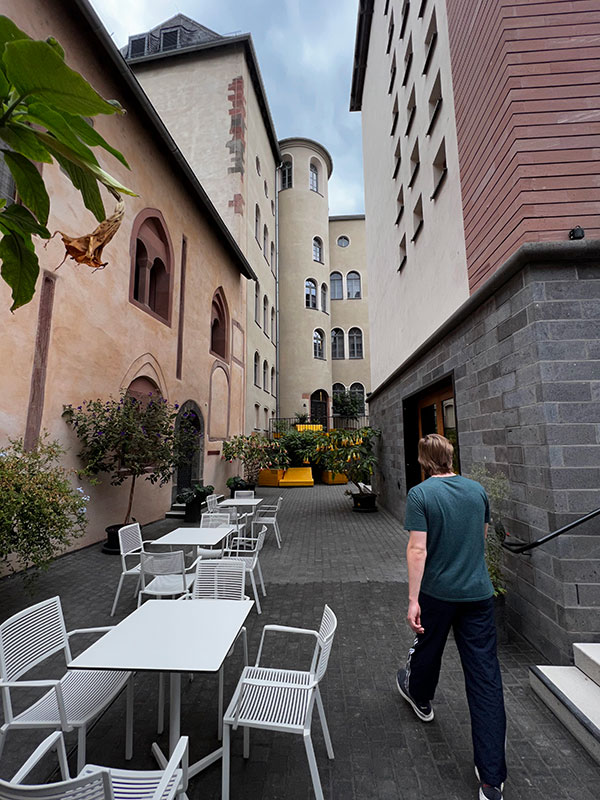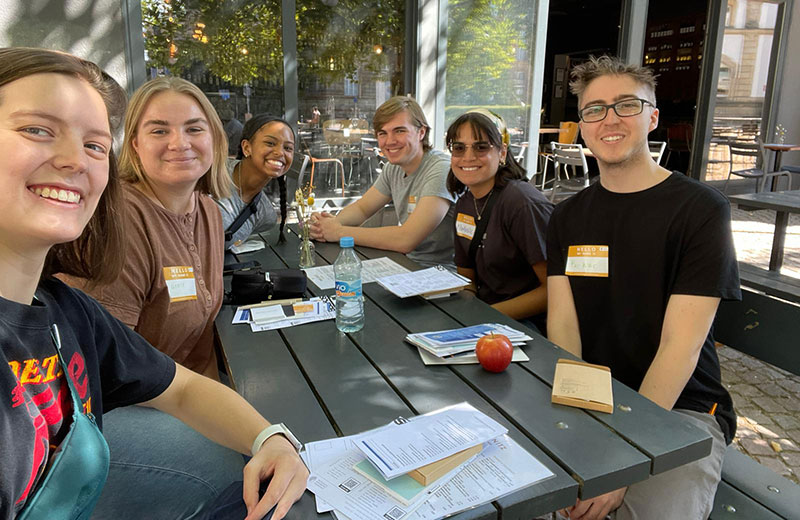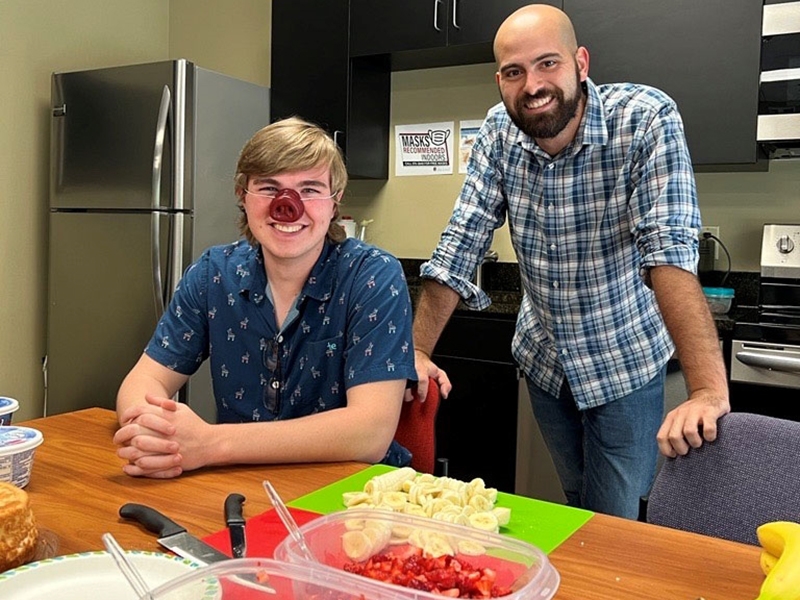During Summer 2022, biomedical engineering junior Dylan Pledger became the first undergraduate student intern to join the Institute of Integrative and Innovative Research technical team. Pledger participated in the Adaptive Neural Systems Group.
This fall, Pledger participated in the U of A's study abroad program and set off for Germany in August. As the semester draws to a close, the I³R team reached out to Pledger to follow up on his activities and get his feedback about interning at I³R, his semester abroad and what his plans are for the new year.
Pledger spent most of the summer working alongside Tommaso Benigni, a doctoral student in biomedical engineering and I³R who is developing a framework for assessing benefits to the control of Multi degree of freedom prostheses. The research they performed will provide insight to how providing a perceived sensation on the phantom limb of people with limb loss could benefit them in their daily lives.
"During my time as an I³R intern, I was introduced to what the actual day-to-day tasks and duties of a researcher were through hands-on experience," Pledger said. "I had the chance to become familiar with designing and printing 3D model parts for the purpose of fulfilling specific functions related to a prosthetic hand interface project that forms Tommaso's research. I also helped create software to drive a sensory feedback system utilized to assess the most effective way to combine the sensors coming from the fingertips of a prosthetic hand into a single value."
Of the work that Pledger was a part, Benigni described why he thought it was important for Pledger to have the experience.
"As an undergrad attending classes, you gain book knowledge and some knowledge through labs as part of classwork. Participating in a working lab gives students the hands-on experience most people won't get until they begin working in their profession," Benigni said. "Having first-hand knowledge of what is expected in real-world labs gives interns a better understanding of what type of work they may perform as a career."
 Dylan Pledger crosses a courtyard in Darmstadt, Germany. |
Along with taking classes in Darmstadt, Pledger also managed to tour a portion of Europe, make contacts and friends, and is currently applying for internships abroad in Germany to further his experience and education over the summer of 2023.
"The style of learning is very different here. There's less emphasis on rote memorization and constant homework and quizzes, replaced instead with allowing the students to decide what method of study is most effective for themselves," Pledger said. "I plan on doing most of my heavy traveling over winter break, but even in Darmstadt and Frankfurt alone you can see a lot of interesting architecture and city planning. I've enjoyed the opportunity to meet and speak with not only native Germans, but also students studying abroad from places like Iran, China, Brazil and so many others as well."
When asked about his plans for the Fall 2023 semester, Pledger said that he was looking forward to returning to the U of A.
"Although I've enjoyed my semester abroad, I'm ready to get back to school to finish out my degree and move forward into my career," Pledger said. "Both my experience abroad, and especially my experience with the ANS Group working with Tommaso, have reinvigorated my drive to work with biomedical systems. What I learned in school kept me going towards what I knew would be a good career for me, but what I've experienced in the lab not only cemented that idea but also continues to provide motivation that I have chosen the correct career path."
Giving students the opportunity to work with researchers is something Ranu Jung, I³R's executive director, endowed chair, associate vice chancellor and distinguished professor in biomedical engineering, takes seriously.
"Problem-based hands-on project experience with a research group offers a student opportunities to explore, innovate and find solutions; they learn from the teamwork and of the importance of meeting milestones and deliverables," Jung said. "I expect I³R to be a place for students, like Dylan, to engage in activities that open their eyes to new possibilities while giving them enhanced technical training."
Are you an undergraduate student interested in being an I³R Intern? If so, reach out to icubedr@uark.edu.
Q&A with Dylan Pledger
1. When you talk to other students/people about your summer at I³R, how do you explain the research with which you assisted?
Depending on the person's familiarity with engineering or anatomy, I explain the basic premise of able-bodied prosthesis and then delve into the specifics of my duties and how they related big picture to Tommaso's research.
2. While assisting Tommaso with his research, what's something that you learned generally about graduate work that you didn't know?
It is more bureaucratic than I initially anticipated, but I assume every field is to some degree. But beyond that superficial note, not every first draft is what you'll end up going with. My mentors there helped me refine my thought process when tackling problems, both through telling me flaws in my approach and by witnessing them lead by example.
3. What's something specific that made you think, "I didn't know that's how that's done!" or have an "Aha" moment?
Kind of related to the previous comment, but I had a very one-track mind on how to solve problems, which worked for the most part in school where most issues have one solution or approach. But the people at I³R helped to broaden the scope of how I looked at and approached problems, which helps with actually trying to engineer something, where there is almost never one approach.
4. Reflecting on your time at I³R, how do you think this internship helped you better prepare for your next semester of coursework?
I think it reframed how I look at coursework more than anything. Being able to experience the field I am working towards, not as an abstract, but rather as something tangible just recontextualized a lot of what I was learning. Now, it is less of "learning to overcome the barrier of entry," instead it feels more like "learning so that I may excel at what I do."
5. What's the one piece of advice you'd give to other undergraduates considering a summer internship?
Do it. Easily the best decision I made as an undergraduate. It cemented for me the idea that I want to work in this field that I've been dreaming of and working towards since I was eight years old, and it likely will do the same for you. If not, then you may realize that it isn't what you thought it was cracked up to be, and that information is equally valuable.
6. Would you explain what you've been doing during your semester abroad?
I have been taking classes at the Technische Universität Darmstadt since September and will be participating in an internship come this March. The U of A has a great study abroad program for German that I've been doing since freshman year, and this is one of the steps in fulfilling that program.

Dylan Pledger, at back, with other students in Germany.
7. Did you have time to travel? If so, what parts of Germany or other parts of Europe did you visit? Did anything make a big impression, and if so, what and why?
There's not been too much time during the semester, not as many breaks and holidays as in the States, so trips have mostly been local (within one hour of Darmstadt). I have, however, been exploring the city itself quite a bit as there is a lot of downtime day to day. The biggest impression so far has been how easy that has been. Darmstadt is, intentionally designed or not, a completely walkable city. I have two supermarkets, multiple restaurants, two gyms and a convenience store within a five-minute walk of my apartment, and I live on the outskirts of town. It's been a really positive change for me personally, as I enjoy this kind of lifestyle.
8. Who did you meet during the semester that made an impression on you?
I enjoy boxing, and most of the people at my local boxing gym have made the strongest impression on me as I see them most every day, and they barely speak English. When I'm on campus, most people don't interact much, and when they do, they are very willing to speak English with me as practice. Stark contrast to the people in the gym who speak little to no English and are extremely friendly and outgoing. I've made a lot of connections there and enjoy the practice I get, both with the language and with the boxing.
9. How do you think the fall semester will be different for you after a summer internship and a semester abroad under your belt?
I imagine the focus will be less on getting through the classes as something that is a necessary step to achieve my goals, to rather a step taken out of a desire to absorb the information so that I may utilize it later.
10. Is there anything else you'd like to add?
The people in the I³R team treated me as one of their own almost immediately. They made me feel welcome, at home and confident, even when I felt like I wasn't up to the tasks they had laid out for me. They helped me develop a plethora of critical skills, and if I were given the opportunity to do it again, I would immediately accept it, as I know I would continue to grow and enjoy my time spent there.
Topics
Contacts
Peg Hart, project advancement specialist
Institute for Integrative and Innovative Research
479-575-6402,
